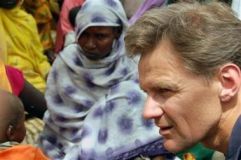UN relief official warns of collapse in Darfur
May 19, 2006 (UNITED NATIONS) — The next few weeks are critical for millions of people in Darfur as foreign aid efforts face collapse, and malnutrition and mortality may increase, the chief U.N. relief official said on Friday.
 Jan Egeland, the U.N. emergency relief coordinator, said attacks against aid workers had been relentless and access difficult. He said the under-equipped African Union force in Darfur needed immediate help and that international funding had to increase, especially from Gulf nations.
Jan Egeland, the U.N. emergency relief coordinator, said attacks against aid workers had been relentless and access difficult. He said the under-equipped African Union force in Darfur needed immediate help and that international funding had to increase, especially from Gulf nations.
“The next few weeks will be make or break. We can turn the corner toward reconciliation and reconstruction, or see an even worse collapse of our efforts to provide protection and relief to millions of people,” Egeland told the 15-nation U.N. Security Council of his recent trip to Sudan and Chad.
“The next few weeks will be absolutely critical for millions of people in this region,” he said.” Otherwise “malnutrition and mortality rates would multiply in some areas, within weeks, not months.”
Egeland said help had to be given to the 7,300-strong African Union force, the only bulwark against atrocities in Darfur. Some troops had not been paid in two months, he added.
He said a U.N. force to augment the African troops was “absolutely necessary” and the only one which could help 2 to 3 million people return to their homes.
Sudan has not agreed to the deployment of a U.N. force and has not permitted the United Nations to send a military assessment mission to Darfur.
BRAHIMI TO KHARTOUM
To this end, U.N. Secretary-General Kofi Annan asked Lakhdar Brahimi, a former Algerian foreign minister, to go to Darfur next week in an effort to persuade the Sudan government to allow the mission and the subsequent U.N. force.
Diplomats said Brahimi, who resigned in December as a special U.N. envoy after having negotiated deals in Afghanistan and Iraq, could be persuasive with Khartoum. Arab nations have generally backed Sudan and refrained from criticizing Khartoum.
The Security Council on Tuesday adopted a resolution giving the Sudan government a week to let in the U.N. planning team.
The council has also called for strict observance of a far-reaching peace accord, adopted on May 5 in Abuja, Nigeria, and signed by the government but not all the rebel groups opposing it. Fighting has not yet subsided.
Some 200,000 people have died and nearly 3 million have been thrown out of their homes in Darfur, a vast arid region in western Sudan.
The conflict erupted in 2003 when mostly non-Arab tribes took up arms, accusing the Arab-dominated government of neglect. Khartoum retaliated by arming mainly Arab militia, known as Janjaweed, who began a campaign of murder, rape, arson and plunder.
Egeland said the Sudanese government had promised to lift restrictions on aid workers, especially a Norwegian relief group, that was caring for 90,000 people.
Egeland also said that that donations had increased, especially from some European nations and the United States, which recently pledged shipments of 47,600 metric tons of food, enabling the World Food Program to cancel some of the ration cuts it had imposed.
But he said nations in the Gulf, wealthier Asian nations and some European countries had cut donations from a year ago and the relief efforts still fell short.
Egeland also said he believed Sudanese authorities when they said they “wanted to turn the corner” and disarm the Janjaweed. But he noted it was easier for authorities to tell people to rape and plunder than to make them stop.
(Reuters)
